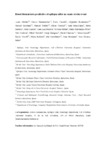Blood biomarkers predictive of epilepsy after an acute stroke event

View/
Use this link to cite
http://hdl.handle.net/2183/40458Collections
- Investigación (FCS) [1293]
Metadata
Show full item recordTitle
Blood biomarkers predictive of epilepsy after an acute stroke eventAuthor(s)
Date
2020-08-28Citation
Abraira L, Santamarina E, Cazorla S, Bustamante A, Quintana M, Toledo M, Fonseca E, Grau-López L, Jiménez M, Ciurans J, Luis Becerra J, Millán M, Hernández-Pérez M, Cardona P, Terceño M, Zaragoza J, Cánovas D, Gasull T, Ustrell X, Rubiera M, Castellanos M, Montaner J, Álvarez-Sabín J. Blood biomarkers predictive of epilepsy after an acute stroke event. Epilepsia. 2020 Oct;61(10):2244-2253.
Abstract
[Abstract]
Objective: Blood biomarkers have not been widely investigated in poststroke epilepsy. In this study, we aimed to describe clinical factors and biomarkers present during acute stroke and analyze their association with the development of epilepsy at long term.
Methods: A panel of 14 blood biomarkers was evaluated in patients with ischemic and hemorrhagic stroke. Biomarkers were normalized and standardized using Z-scores. Stroke and epilepsy-related variables were also assessed: stroke severity, determined by National Institutes of Health Stroke Scale (NIHSS) score, stroke type and cause, time from stroke to onset of late seizures, and type of seizure. Multiple Cox regression models were used to identify clinical variables and biomarkers independently associated with epilepsy.
Results: From a cohort of 1115 patients, 895 patients were included. Mean ± standard deviation (SD) age was 72.0 ± 13.1 years, and 57.8% of patients were men. Fifty-one patients (5.7%) developed late seizures, with a median time to onset of 232 days (interquartile range [IQR] 86-491). NIHSS score ≥8 (P < .001, hazard ratio [HR] 4.013, 95% confidence interval [CI] 2.123-7.586) and a history of early onset seizures (P < .001, HR 4.038, 95% CI 1.802-9.045) were factors independently associated with a risk of developing epilepsy. Independent blood biomarkers predictive of epilepsy were high endostatin levels >1.203 (P = .046, HR 4.300, 95% CI 1.028-17.996) and low levels of heat shock 70 kDa protein-8 (Hsc70) <2.496 (P = .006, HR 3.795, 95% CI 1.476-9.760) and S100B <1.364 (P = .001, HR 2.955, 95% CI 1.534-5.491). The risk of epilepsy when these biomarkers were combined increased to 17%. The area under the receiver-operating characteristic (ROC) curve of the predictive model was stronger when clinical variables were combined with blood biomarkers (74.3%, 95% CI 65.2%-83.3%) than when they were used alone (68.9%, 95% CI 60.3%-77.6%).
Significance: Downregulated S100B and Hsc70 and upregulated endostatin may assist in prediction of poststroke epilepsy and may provide additional information to clinical risk factors. In addition, these data are hypothesis-generating for the epileptogenic process.
Keywords
Epileptogenesis
Poststroke epilepsy
Seizures
Stroke
Poststroke epilepsy
Seizures
Stroke
Editor version
Rights
"This is the peer reviewed version of the following article: Abraira L, Santamarina E, Cazorla S, Bustamante A, Quintana M, Toledo M, Fonseca E, Grau-López L, Jiménez M, Ciurans J, Luis Becerra J, Millán M, Hernández-Pérez M, Cardona P, Terceño M, Zaragoza J, Cánovas D, Gasull T, Ustrell X, Rubiera M, Castellanos M, Montaner J, Álvarez-Sabín J. Blood biomarkers predictive of epilepsy after an acute stroke event. Epilepsia. 2020 Oct;61(10):2244-2253, which has been published in final form at [https://doi.org/10.1111/epi.16648]. This article may be used for non-commercial purposes in accordance with Wiley Terms and Conditions for Use of Self-Archived Versions. This article may not be enhanced, enriched or otherwise transformed into a derivative work, without express permission from Wiley or by statutory rights under applicable legislation. Copyright notices must not be removed, obscured or modified. The article must be linked to Wiley’s version of record on Wiley Online Library and any embedding, framing or otherwise making available the article or pages thereof by third parties from platforms, services and websites other than Wiley Online Library must be prohibited."
ISSN
0013-9580





